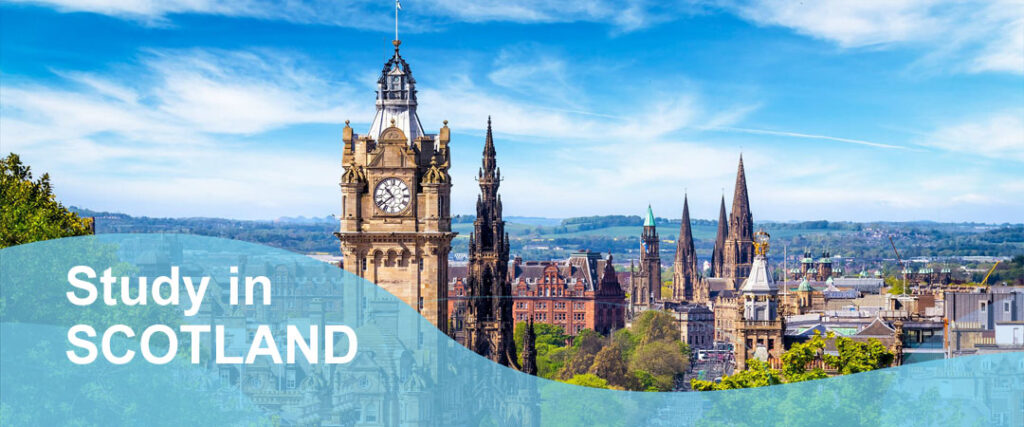
Scotland is a breathtakingly beautiful country located in the northern part of the British Isles, known for its spectacular landscapes, fascinating history, and vibrant culture. With an area of approximately 78,000 square kilometers and a population of around 5.5 million people, Scotland boasts a diverse range of cities, each with its own unique character and charm. The capital city, Edinburgh, is steeped in history and culture, while Glasgow, the largest city, is renowned for its vibrant arts and music scene. Other notable cities in Scotland include Dundee, Aberdeen, Inverness, Perth, and Stirling.
Scotland is a country filled with exciting events all year round, which make it an ideal place to study and live. Whether you’re interested in exploring Scotland’s rugged coastline, hiking through its rolling hills, or visiting its iconic castles and whisky distilleries, this country has something for everyone. With its rich history and traditions, Scotland is a fascinating destination that offers a warm welcome to visitors from around the world. Every year there are over 350 festivals, there’s always something new and exciting happening in Scotland – another great reason to study here.
Scotland has a rich and colorful culture that includes many different types of music, art, and literature. The traditional Scottish music scene is distinctive, echoing with the haunting melodies of bagpipes, fiddles, and drums that seem to flow effortlessly with the country’s natural landscapes. Scotland’s rich literary heritage has produced some of the most distinguished writers, such as Robert Burns, Sir Walter Scott, and Irvine Welsh, whose masterpieces continue to captivate and stimulate new generations of readers.
Education System and Practices:
The education system in Scotland is overseen by the Scottish government and is separate from the education systems in England, Wales, and Northern Ireland. The education system in Scotland is known for its emphasis on creativity, critical thinking, and innovation. It is also known for its commitment to promoting equal access to education for all students, regardless of their background or socio-economic status.
Scotland has more world class universities per head of population than anywhere else in the world. With 19 world class institutions, Scotland’s university sector offers unparalleled quality and choice. Scotland’s universities are proud to offer the highest rates of student satisfaction in quality of teaching in all of Britain. Scotland’s universities offer their graduates the highest rate of employment or further study in the whole of the United Kingdom.
The education system in Scotland is notable for its focus on inclusion, with efforts made to ensure that all students have access to high-quality education regardless of their background or ability. This includes a commitment to providing additional support for students with learning difficulties or disabilities.
The system is structured into three main stages: primary education, secondary education, and tertiary education.
Primary education in Scotland lasts for seven years, from the ages of five to twelve. Children are taught a range of subjects, including literacy, numeracy, science, social studies, and health and wellbeing. There is also a strong emphasis on developing creativity and critical thinking skills.
Secondary education in Scotland lasts for six years, from the ages of twelve to eighteen. Students study a broad range of subjects in the first two years, then gradually specialize in their chosen subjects over the following years. The Scottish Qualifications Authority (SQA) administers a range of qualifications, including Standard Grades, Higher Grades, and Advanced Higher Grades, which are the equivalent of GCSEs, A-levels, and university-level qualifications, respectively.
Tertiary education in Scotland is provided by universities, colleges, and other higher education institutions. Scotland is home to the oldest and most prestigious universities in the world, such as the University of St Andrews and the University of Edinburgh. Scottish universities are known for their strong research programs and their commitment to widening access to higher education.
One of the unique features of the Scottish education system is the Curriculum for Excellence, which was introduced in 2010. This is a broad-based curriculum that is designed to provide students with a range of skills and knowledge, including literacy, numeracy, and digital skills, as well as creativity, problem-solving, and teamwork.
In terms of teaching practices, Scotland has a strong tradition of collaborative learning and inquiry-based approaches. Teachers are encouraged to work together to develop lesson plans and share best practices, and students are encouraged to take an active role in their own learning. Assessment in Scotland is based on a combination of coursework and exams, with a focus on continuous assessment throughout the school year rather than relying solely on final exams. This is intended to provide a more holistic view of student progress and achievement.
A Scottish education provides great prospects for employment. Employers highly value graduates from Scottish universities, with nine out of ten graduates finding employment or further study within six months of graduation. This is down to many of the education institutions working in partnership with employers, to fully prepare students for the transition into the work place.